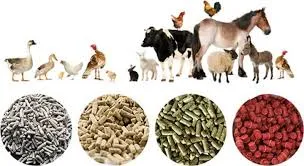
Jan . 06, 2025 16:01 Back to list
avermectin
Avermectin, a significant breakthrough in the field of agriculture and medicine, is a group of compounds with potent effects against a variety of parasites. Developed in the late 20th century, these compounds have revolutionized pest control in multiple sectors, including agriculture, veterinary medicine, and even in human parasitic disease management.

One of the most remarkable aspects of avermectin is its effectiveness as an insecticide and acaricide, widely utilized to enhance crop protection. Farmers globally rely on it to safeguard their yields against destructive pests. Unlike many traditional pesticides, avermectin operates by interfering with neural and muscular functions of insects and mites, leading to paralysis and death. This specificity ensures that crops are not only safe from pests but also remain non-toxic to consumers.
In livestock and pet management, avermectin plays a crucial role in controlling internal and external parasites, such as worms and mites. Its efficacy in treating parasitic infections such as heartworm in dogs and cats is especially valued by veterinarians. Additionally, its application extends to poultry, cattle, and sheep, where it significantly reduces the burden of parasites that impair livestock health and productivity. The broad-spectrum action of avermectin not only improves animal health but also contributes to increases in the quality and quantity of livestock-derived products like milk, meat, and wool.

Medical professionals have found avermectin derivatives particularly useful in human medicine as well. Ivermectin, a derivative, is a celebrated antiparasitic to combat neglected tropical diseases such as river blindness (onchocerciasis) and lymphatic filariasis. The impact of ivermectin in eradicating these diseases in endemic regions has been transformative, earning its developers the Nobel Prize in Physiology or Medicine in 2015. As a single-dose solution, its ease of administration and low-cost production make it a sustainable option for public health initiatives in low-resource settings.
avermectin
Sustainability is a noteworthy characteristic of avermectin products. These compounds biodegrade relatively quickly in the environment, reducing concerns of long-term ecological impact. This trait makes them a preferable choice over synthetic pesticides that persist and accumulate in ecosystems, potentially harming non-target species and disrupting biodiversity.
While the benefits of avermectin are well-documented, responsible usage remains essential to mitigate resistance development. Over time, pests can evolve resistance to pesticides, diminishing effectiveness and requiring new chemicals. To prevent this, integrated pest management strategies recommend alternating avermectin with other control measures, maintaining its effectiveness for future generations.
Consumer awareness around avermectin’s applications emphasizes its intrinsic safety when used correctly. Regulatory authorities worldwide endorse its application, reassuring farmers, veterinarians, and healthcare providers of its approval and monitoring. Such endorsements strengthen trust in its continued use.
In conclusion, the multifaceted applications of avermectin underscore its invaluable role in promoting health and productivity across various sectors. Essential to dealing with both agricultural pests and parasitic diseases, its benefits are backed by extensive research, regulatory approval, and real-world success stories. As global demands for sustainable solutions grow, avermectin stands as a testament to scientific innovation meeting practical challenges efficiently and safely.
-
Premium China Bacillus Subtilis Supplier & Factory Solutions
NewsJul.30,2025
-
Premium Avermectin Supplier in China | Custom Solutions Available
NewsJul.29,2025
-
China Bacillus Subtilis Supplier - Custom Factory Solutions
NewsJul.29,2025
-
China Salivation: Leading Custom Salivation Supplier & Factory Solutions
NewsJul.29,2025
-
Leading Lincomycin Hydrochloride Manufacturer & Supplier with High Purity
NewsJul.29,2025
-
Bio-Enzyme Yogurt Growth Promoter Factory - Top Quality Manufacturer & Supplier
NewsJul.28,2025




